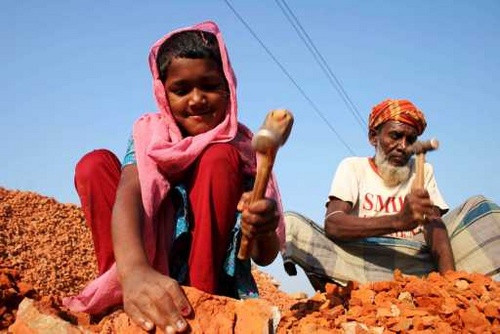Table of Contents
Child Labour in Bangladesh
Despite numerous interventions and a good deal of media coverage, progress on ending child labour is not progressing. I was fortunate to travel to Bangladesh at the end of last year to deliver training to the Islamic Relief Bangladesh team and to observe some of the projects that are currently being rolled out. I saw some of the child labour referred to in the Kamrangichur district near to the capital. Young boys’ bare chested and bare foot welding in auto repair shops, in other areas children as young as eight work in tanneries producing leather where they are exposed to a toxic cocktail of formaldehyde, sulphuric acid and more on a daily basis.
Kamrangichur
Kamrangichur is an area of extreme poverty. Here I visited a project funded by Islamic Relief UK called ‘Elimination of Hazardous Child Labour’. The project supports 275 children aged 6-15 years by giving the family grants for setting up income generating activities as well as financial support for schooling costs. Here I saw some of the conditions where children work; tiny unventilated rooms with poor lighting. The notion of health and safety, so much a part of workplace DNA in the Western world, is totally absent.
Getting and keeping working children into formal education can be challenging as often their psychological and physical health is not good. The dropout rate is high and NGO’s providing financial support need to also work with the schools to reduce this.

Bangladesh
In Bangladesh targets for eradicating child labour have been missed over and over again. There are too few inspectors and the penalty for Child Labour Law violations stands at just $USD 63, hardly a deterrent. The former International Development Secretary Penny Mordant described child labour as ‘A shameful stain on our global conscience’.
However eliminating child poverty is not simply about imposing Western ideals on complex issues. Many families where income is barely at subsistence levels have few choices. An outright ban may have unintended, adverse consequences and drive activities underground. We would do well to remember that nearly half of the workforce in British cotton mills in the early 19thcentury were children.
Dr Frank Wijen from Rotterdam School of Management suggests ‘it would be sensible to take a measured approach and to apply some basic humane working conditions in conjunction with a targeted evolving approach that considers the actual outcomes of implemented measures’.
I discovered an unofficial anthem whilst in Bangladesh… ‘We Shall Overcome’. The modern version of the song was first said to have been sung by tobacco workers during a 1945 strike in Charleston, South Carolina USA. Here are a few lines:
We shall overcome, we shall overcome, we shall overcome some day
It is hard to think of a more appropriate anthem for a country that is bonded by the determination to rise above the challenges in their lives.
Written by Diane Conway
Learning & Development Partner





